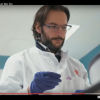Latest questions:
Trending questions:
Hot questions:
How will IoT impact Lifesciences and Healthcare?
4 answers
- Leading to the idea of the 'quantified self' - as stated above, increased sensor use and connectivity leads to greater data capture, giving greater insights towards diagnoses, etc.
- Faster data inputs and outputs, perhaps leading directly to a patients' EMR for ease of access by physicians
- Greater data quality - currently, capture is noisy due to inaccurate sensors, etc. which leads to poor quality. Wider use can allow for better data capture (through, perhaps recognition of noise through machine learning, etc.)
There is a NIH initiative lead by Vanderbilt University and Google:
http://www.genengnews.com/gen-news-highlights/vanderbilt-googles-verily-to-launch-precision-medicine-initiative-cohort/81252411
The IoT can also increase customer-centricity. Medical device companies deal with costly devices vital to patients’ health. These devices are generally used for prolonged periods, so experience considerations are crucial. Continuous Internet-enabled monitoring of medical devices can better anticipate required maintenance so that service technicians can be called proactively and doctors notified before a failure occurs.
But for the life sciences industry, the greatest promise of the Internet of Things lies in the area of personalized medicine; i.e., enabling the production of batch sizes of one. It does this by embedding production orders within an individual part or an individual therapeutic batch. At the assembly stage, those directions are passed onto intelligent software. The software performs a live adjustment for the single unit.
The Internet of Things (IoT) healthcare is one of the example of technology/business convergence among information and communications technology (ICT), medical/pharmaceutical technologies and sensors and devices technology, which can provide easy and user-friendly healthcare services for the betterment of human health and conditions. IoT is a growing technology that has high potential to discover new drugs and medical treatments and it will improve the efficiency and quality of healthcare w.r.t. several features such as flexibility, adaptability, affinity, cost shrinkage, and high speed. Internet of Things (IoT) has been widely applied to interconnect available medical resources and provide reliable, effective, and smart healthcare service to the elderly and patients with a chronic illness. Sensor networks for healthcare IoT (Internet of Things) have advanced rapidly in recent years, which has made it possible to integrate real-time health data by connecting bodies and sensors.
Applications of IoT in Life Sciences & Health Care
• First & foremost – Mobility of medical data across the globe, made medical reports publicly available
• Medicine dose controller
• Telemedicine – Network among different touch points like Clinic, pharmacy, Patients home, medical practices, ambulances and, hospitals
• Drug management – in-house and e-health, user tracking, reminders
• Wirelessly patient monitoring system – Connecting doctors, clinicians, emergency ward/department
• Wearable health monitoring systems – Network among patients and patients house, doctor, clinic. hospital, pharmacy, ambulance, Realtime health monitoring
• Intelligent Pillbox/Intelligent personal assistants on mobile health environments – Network interfaces are Patients/old patients, pharmacy, doctors, clinic, ambulance
• Personal Healthcare Devices
• Lifestyle Disease management – Weight loss, fat burning, blood pressure, heart beats
• Predictive Healthcare – Real time data analysis by connecting devices, patients and doctors, data base
• Medicine reminder






